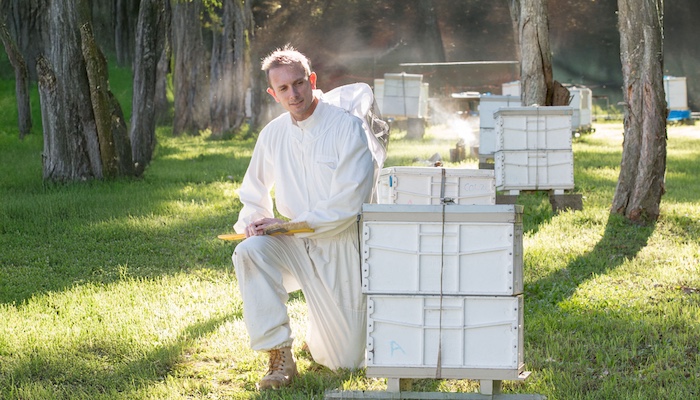The projects include a potential treatment for Alzheimer’s disease, an investigation of whether metal-containing compounds could combat deadly fungal infections, a driver of cardiovascular disease, and the neurons that control swallowing.
Deputy Vice-Chancellor (Research) Professor Sakkie Pretorius congratulated the researchers on their success.
“It is very pleasing to see the work of our health and medical research teams being acknowledged in the form of grants like these,” he said.
“Such significant support is a tremendous vote of confidence in our health and medical research streams, but also what we are doing as an institution.”
Systems neuroscientist Professor Simon McMullan, of Macquarie Medical School and the Data Horizons Research Centre, receives a $1,334,618 over four years for his group's study of the carotid body and the way information from this tiny oxygen-sensing organ is decoded by the brain.
The dysfunction of nerves that sense chemicals in the bloodstream contributes to cardiovascular disease. Their abnormal behaviour tricks the body into thinking it is suffocating, activating emergency systems that are protective in the short term but harmful when permanently activated.
The Ideas Grant project represents another step in the journey towards better treatments for cardiovascular disease, which remains responsible for a quarter of all deaths in Australia and is the major determinant of life expectancy worldwide.
The team, which includes researchers from Macquarie University, the University of Aukland, the University of Melbourne and the University of Queensland, will investigate the genetic fingerprint of oxygen-sensing neurons, allowing the design of selective drugs that manipulate dysfunctional cells without interfering with healthy sensors.
Dr Bowen Dempsey, a neuroscientist from the School of Psychological Sciences and Macquarie Medical School, receives a $1,186,360 Ideas Grant to look at the genetic signature of the neurons that control swallowing.
The muscles that help move food from the mouth to the stomach are controlled by a set of nerves that are genetically different from those that control the rest of the body.
The team’s recent work suggests that expression of protein by the gene, Phox2b, is also shared by motor circuits in the brainstem that coordinate swallowing, and they will now use Phox2b to identify and study these vital brain centres for the first time.
The four-year project has the potential to improve the quality of life for people affected by conditions ranging from stroke and head injury to dementia, motor neurone disease and multiple sclerosis.
Professor Lars Ittner, from the Dementia Research Centre, receives an NHMRC Development Grant to the value of $468,629 over three years.
Alzheimer’s disease is the most common form of dementia and currently has no effective treatments.
Professor Ittner and his team have developed a novel drug candidate that blocks a central disease process and effectively prevents loss of neurons in the brain.
The grant will allow them to undertake critical research and outline strategies to transition the drug candidate to commercialisation and clinical translation, to eventually benefit those living with dementia.
Associate Professor Amy Cain, from the Faculty of Science and Engineering, receives a three-year grant from NHMRC Joint Programming Initiative on Antimicrobial Resistance, totalling $373,016.
Her project, entitled 'Revitalising the Antifungal Pipeline with Transition Metals', will investigate the potential for metal-containing compounds to kill deadly fungi.
The investigation team will use new techniques and adapt machine learning approaches to create and test thousands of metal compounds to see if any are effective against fungal infections.
The World Health Organisation has identified antimicrobial resistance as one of the top global public health and development threats.
Promising compounds will be studied to learn how they work, and the best will be tested in animal models. The team hopes the work could lead to the development of new, much-needed treatments for stubborn fungal infections.
Mr Josh Kraindler from GenIMPACT: Centre for the Economic Impacts of Genomic Medicine at Macquarie Business School receives a $135,479 NHMRC Postgraduate Scholarship over four years.
His PhD project, 'Poverty and rare genetic diseases in Australia: How precision medicine can improve outcomes for patients and families', aims to explore how customised treatments tailored to an individual's genetic profiles can alleviate poverty by improving health outcomes and social participation.
He will be supervised by Professor Deborah Schofield and Associate Professor Rupendra Shrestha.



